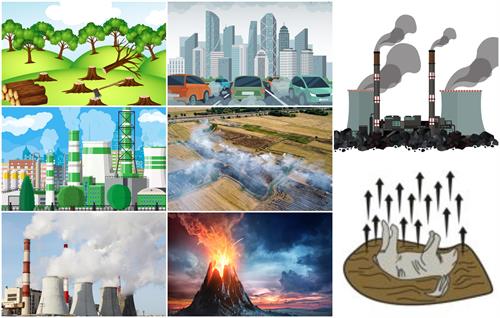PDF chapter test TRY NOW
Causes of global warming:
The greenhouse gases occur naturally; however, human activities increase the concentration of the gases. Some of these activities are listed below:
- Deforestation
- Burning fossil fuels
- Agricultural activity
- Decay of dead organism
- Thermal power plant
- Pollution of automobile
- Eruption of volcanoes
- Industrialisation
Deforestation: Trees help to keep the climate by absorbing carbon dioxide from the atmosphere. When we cut down trees, that beneficial effect is lost and the carbon stored in the trees is released.
Burning of fossil fuels: The burning of fossil fuels such as natural gas, coal and oil produce more carbon dioxide.
Agricultural activity: Cows and sheep produce a large quantity of methane when they digest their food. Fertilisers have nitrogen, which produces nitrous oxide. Fertiliser is a natural/chemical substance added to land or soil for the better growth of plants.
Decay of dead organism: After the death of an organism, the decomposition releases carbon into the air, soil and water, resulting in carbon dioxide formation.
Thermal power plant: Thermal power plants pump out many greenhouse gases as by-products while burning fossil fuels. Carbon dioxide is one of the main gases.
Pollution of an automobile: Gas consuming car and truck emits carbon dioxide and other greenhouse gases.
Eruption of volcanoes: When volcanoes erupt, they emit a mixture of gases along with ashes and particles. Volcanic gases like sulfur dioxide can cause global cooling, while carbon dioxide causes global warming.
Industrialisation: The rapid population growth associated with industrialisation because a larger population leads to increased demand for products, higher production levels, consumption and automatically rises levels of greenhouse gases.

Effects of global warming:
- With an increase in the temperature the average temperature increases.
- Ice melts at a rapid pace.
- Rise in the sea levels.
- Leads to soil erosion and unseasonal rains.
- The ocean, which is basic (with a \(pH\) of \(8.1\)), becomes acidic. However, when the ocean continuously absorbs carbon dioxide, it becomes more acidic.
- Increase in spreading of waterborne and insect-borne diseases.
How to prevent global warming?
- Minimise the use of fossil fuels.
- Plant more trees.
- Restrict the use of CFCs (chloro fluorocarbon).
- Use a product that can be reusable and recycling.
- Buy an energy-efficient product, which burns less fuel for making electricity.
